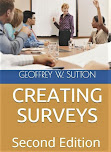The Adult Hope Scale
The Adult Hope Scale developed by C. R. Snyder of the University of Kansas is an easy to use measure of hope. The original scale has 12-items, which measure two dimensions of hope based on hope theory. Four measure agency and four measure pathways--the other four are distractors.
The agency concept measures the capacity to focus energy on a goal. The pathways concept assesses plans to achieve goals. In recent studies, the four distraction items are often dropped leaving 8-items. Researchers often use the total score for the 8-items as a measure of trait (aka dispositional) hope.
I have also included a Spanish language measure of hope in this post.
Here's the text we (Sutton et al., 2018) used to refer to the scale along with our findings.
The items used a response format of 1 = definitely false to 8 = definitely true. A sample item is, “I meet the goals I set for myself.” Snyder et al. (1991) reported alphas between .79 and .95 in four samples.
In our two studies, the alpha reliability values were .82 and .95.
As you might expect, hope is positively correlated with well-being, which provides some evidence supporting validity. Hope was significantly correlated with the Schwartz Outcome Scale in both studies (.64, .76) and with the Theistic Spiritual Outcome Scale in study 2 (.72).
Counselors and psychotherapists may consider the scale in assessment of clients because it strongly predicts satisfaction with therapy and patient well-being, which are used as outcome measures as noted above (See Sutton et al., 2018)
Researchers may want to use hope in a variety of surveys looking at characteristics of populations. The reliability values of the items vary with the study yet indicate an overall consistency in many contexts.
The 8-item Scale
LINK TO COPY OF THE ADULT HOPE SCALE (also called The Trait Hope Scale)
Learn more about Hope Theory
Available from AMAZON
A Spanish hope scale (Escala de Esperanza) is also available. An article suggests adequate psychometric properties for a 28-item version (Uribe, Bardales, & Herth, 2012).
Read more about hope in Chapter 5 of Living Well
Snyder, C. R., Harris, C., Anderson, J. R., Holleran, S. A., Irving, L. M., Sigmon, S. T., Yoshinoba, L., Gibb, J., Langelle, C., & Harney, P. (1991). The will and the ways: Development and validation of an individual-differences measure of hope. Journal of Personality and Social Psychology, 60, 570-585. doi:10.1037/0022-3514.60.4.570
Snyder, C. R., Parenteau, S. C., Shorey, H. S., Kahle, K. E., & Berg, C. (2002). Hope as the underlying process in the psychotherapeutic change process. International Gestalt Journal, 25,11-29.
Sutton, G. W., Kelly, H., Worthington, E. L. Jr., Griffin, B. J., & Dinwiddie, C. (2018) Satisfaction with Christian psychotherapy and well-being: Contributions of hope, personality, and spirituality. Spirituality in Clinical Practice, 5 (1), 8-24. doi: 10.1037/scp0000145 Academia Link ResearchGate Link
Uribe, P. M., Bardales, M.C., & Herth, K. (2012). Propiedades psicométricas de la Escala de Esperanza de Herth en español. RIDEP, 33, 127-145. (aidep.org)
My Page www.suttong.com
I have also included a Spanish language measure of hope in this post.
Here's the text we (Sutton et al., 2018) used to refer to the scale along with our findings.
The items used a response format of 1 = definitely false to 8 = definitely true. A sample item is, “I meet the goals I set for myself.” Snyder et al. (1991) reported alphas between .79 and .95 in four samples.
In our two studies, the alpha reliability values were .82 and .95.
As you might expect, hope is positively correlated with well-being, which provides some evidence supporting validity. Hope was significantly correlated with the Schwartz Outcome Scale in both studies (.64, .76) and with the Theistic Spiritual Outcome Scale in study 2 (.72).
Using the Hope Scale
Counselors and psychotherapists may consider the scale in assessment of clients because it strongly predicts satisfaction with therapy and patient well-being, which are used as outcome measures as noted above (See Sutton et al., 2018)
Researchers may want to use hope in a variety of surveys looking at characteristics of populations. The reliability values of the items vary with the study yet indicate an overall consistency in many contexts.
The 8-item Scale
LINK TO COPY OF THE ADULT HOPE SCALE (also called The Trait Hope Scale)
Learn more about Hope Theory
Learn more about adding scales like Hope when Creating Surveys
Available from AMAZON
Applied Statistics: Concepts for Counselors
Available from AMAZON
Resource Link: A – Z Test Index
La Esperanza
A Spanish hope scale (Escala de Esperanza) is also available. An article suggests adequate psychometric properties for a 28-item version (Uribe, Bardales, & Herth, 2012).
Read more about hope in Chapter 5 of Living Well
References
Snyder, C. R., Harris, C., Anderson, J. R., Holleran, S. A., Irving, L. M., Sigmon, S. T., Yoshinoba, L., Gibb, J., Langelle, C., & Harney, P. (1991). The will and the ways: Development and validation of an individual-differences measure of hope. Journal of Personality and Social Psychology, 60, 570-585. doi:10.1037/0022-3514.60.4.570
Sutton, G. W., Jordan, K., & Worthington, E.L.,
Jr. (2014). Spirituality, hope, compassion, and forgiveness: Contributions of
Pentecostal spirituality to godly love. Journal of Psychology and
Christianity, 33, 212-226.
Uribe, P. M., Bardales, M.C., & Herth, K. (2012). Propiedades psicométricas de la Escala de Esperanza de Herth en español. RIDEP, 33, 127-145. (aidep.org)
Links to Connections
My Page www.suttong.com
My Books AMAZON and GOOGLE STORE
FOLLOW FACEBOOK Geoff W. Sutton TWITTER @Geoff.W.Sutton
PINTEREST www.pinterest.com/GeoffWSutton
Articles: Academia Geoff W Sutton ResearchGate Geoffrey W Sutton




Comments
Post a Comment